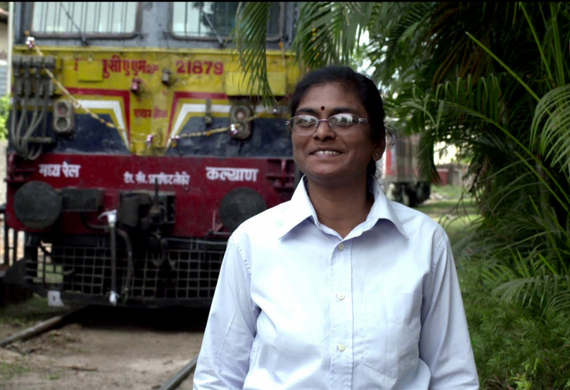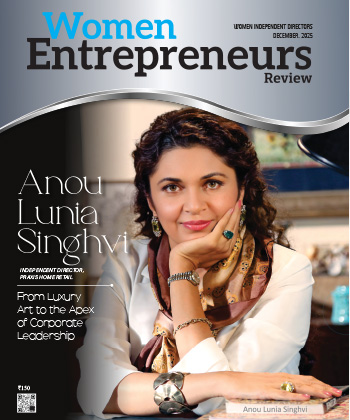
Meet Loco Driver Surekha Yadav, an Achiever Breaking Gender Stereotypes
By: WE Staff
For years women were told what is ‘right’ and ‘wrong’ for them. This also extended to their choice of career; some industries were inherently thought to be better suited for men. In the Indian context, the railways were also thought to be a sector that might not be conducive for women.
This is where trailblazing women like ‘Surekha Yadav’ shine as beacons of change.
Surekha is an Indian Railways employee and the first female train driver in India. She made history yet again by becoming the first woman to operate India's first indigenous semi-high-speed train, the Vande Bharat Express on 13th March 2023.
She joined the Indian Railways in 1986 and has been serving as a train driver for more than 30 years. She has driven a wide range of trains, including local passenger trains, express trains, and freight trains.
Surekha is a trailblazer in the Indian railway industry. Her achievements are a testament to her dedication, perseverance, and commitment to breaking gender stereotypes and paving the way for other women in male-dominated fields.
An Illustrious Career
Surekha is committed to operating trains safely and has never had a railway accident on record. She currently works ten hours a day and drives a variety of trains, including local suburban trains, ghat trains with two engines, and express trains for freight and mail. Her dream job would be as a long-distance train conductor. She has furthermore taken part in initiatives to combat eve-teasing.
She started driving freight trains in 1998 and switched to operating on the ghats on the Western Ghat railway line in 2010. She acquired specialised training to operate the twin-engined passenger trains that navigate the hills of western Maharashtra and was the first motorwoman in Asia to pilot Deccan Queen. She received a promotion to express mail driver in May 2011 and is now serving as Senior Instructor at Driver's Training Centre (DTC) Kalyan.
Surekha becoming the first female train driver in India inspired many young women to break stereotypes and pursue their dreams. She was a role model for many and was widely recognized for her contribution to women's empowerment in the country.
Overall, Surekha’s dedication to her job, her passion for driving trains, and her commitment to breaking gender stereotypes have made her a true initiator and an inspiration to millions of women in India and around the world.
Achievements Galore
In 2001, Surekha made history when she became the first female train driver in India. She drove the prestigious Deccan Queen Express from Mumbai to Pune, and later went on to drive many other trains, including the Flying Ranee Express. Surekha’s accomplishment has been documented in several books and films, including the 2015 Marathi film "Express: Aisle Seat No. 2" and the 2019 documentary "Women's Voice."
In addition to her career in the Indian railways, Surekha is also a social activist and has been actively involved in several initiatives to promote women's empowerment and education in rural areas of Maharashtra.
In 2019, Surekha was awarded the Nari Shakti Puraskar, the highest civilian award for women in India, for her contribution to the railway industry. Her achievement was celebrated by many as a significant milestone for women's empowerment in the country.
In India, Surekha is the foremost woman to operate a train, and as of 2011, 50 female locomotive drivers were driving passenger and freight trains. She has never faced prejudice and has the full support of her family, friends, and co-workers.
Surekha joined the Central Railway in 1986 as a trainee assistant driver after being interviewed by the Railway Recruitment Board, Mumbai, in 1987. In 1989, she was hired as a regular assistant driver, and in 1996, she was the driver of the first local goods train.
An Outcome of Systemic Change
Women's participation in the Indian railways has increased significantly in recent years, thanks to various initiatives and policies aimed at promoting gender diversity and inclusivity in the sector.
One such initiative is the Women's Reservation System (WRS) introduced in 2018, which aims to increase the representation of women in non-gazetted railway jobs. Under this system, 33% of all posts in non-gazetted railway jobs are reserved for women. This policy has helped to increase the number of women in railway jobs, especially in areas such as ticketing, customer service, and administration.
About Surekha’s Personal Life
Surekha was born in 1965 in Satara, Maharashtra. She was later selected for the post of Assistant Loco Pilot (ALP) at the Central Railway's Kalyan shed, where she underwent a year-long training to become a full-fledged train driver in 1991. Over the years, she drove several prestigious trains, including Paschim Express, and Intercity Express.
Her achievement serves as motivation to women across the country who aspire to break gender barriers and pursue careers in traditionally male-dominated fields. Her dedication to her job and her passion for driving trains have paved the way for many other women to follow in her footsteps. The legacies of these powerful women serve as a reminder that women are capable of achieving great things and that their contributions are invaluable.
Most Viewed
- 1 Women's Health Startup HerMD Closing Doors Amid Industry Challenges
- 2 5 Famous Women in Indian Armed Forces
- 3 Saudi Women No longer Require Male Permission for Clothing Choices, says Prince MbS
- 4 Kolkata Medtech Startup Innovodigm Raises Rs 5.5 Crore Seed Funding Led by IAN Group
- 5 Yamunanagar's Kashish Kalra Honoured after Securing 111th Rank in UPSC Civil Services Exam
- 6 Madurai Appoints Its First Woman Corporation Head
- 7 IAS Vijayalakshmi Bidari Appointed as the new Nagpur Divisional Commissioner
- 8 American Entrepreneur Lucy Guo Overtakes T Swift to become Youngest Female Billionaire
- 9 ICC Women's World Cup 2025 Trophy Showcased at Indore's Holkar Stadium
- 10 Aparna Saxena's Beauty Venture AntiNorm Launches in India
- 11 Vidya Nataraj Co-Founded BlueStone Jewellery & Lifestyle files IPO
- 12 5 Women Freedom Fighters of India
- 13 Dr. G Krishnapriya appointed as CEO for Trichy
- 14 M3M & Sirona Partner to Introduce Menstrual Hygiene Vending Machines in 15 Locations
- 15 Punjab Govt launches SHE Cohort 3.0 Supporting Tech-led Women Startups
- 16 Indian origin Lawyer, Sweena Pannu appointed as the US New Superior Court Judge
- 17 The Aurora Tech Award recognizes 4 Indian Women-led Startups
- 18 Kerala's Republic Day parade featured an all-female tableau
- 19 Manisha Kabbur Becomes Karnataka's First Woman International Karate Coach
- 20 Director K. S. Ravikumar's Daughter Maalica Ravikumar Launches Life Coaching Company 'Evergrowth Academy' for Women
- 21 Leezu's Raises Pre-Seed Funding to Accelerate Growth in Sexual Wellness Industry
- 22 Sattu: Super-easy summer drink for PCOS gut healing
- 23 Swathi Nelabhatla creates Sitha App, India's First Women-Exclusive Gig Platform
- 24 7 Timeless Female Kathak Dancers & their Iconic Legacies
- 25 Meet 7 Iconic Women Architects of Modern India & their Most Impactful Work
- 26 This Woman-led Insuretech Startup is Helping Bridge the Education Financing Gap in India
- 27 Women Leaders Share Lessons Learnt from India Women's WC Win
- 28 5 Enterprising Women Founders Powering Singapore's Tech & Innovation Landscape
- 29 4 Women. 4 Stories. One Vision for Smarter, Stronger Healthcare
- 30 Global Gender Gap Narrows to 68.8%, But Full Equality 123 Years Away: WEF Report 2025
- 31 Changemakers: 7 Women Entrepreneurs Taking the Make in India Movement Forward
- 32 Meet Lucy Guo, The Youngest Self-Made Female Billionaire Disrupting Tech
- 33 How Women are Driving India's Festive Online Shopping Surge






